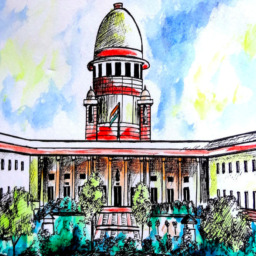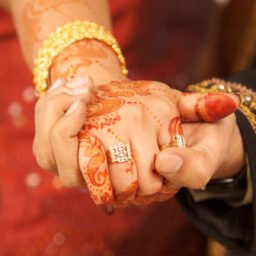
INTRODUCTION
Evolution of legal process in civil matters: In ancient times people use to follow the Veda and Smritis, the rights and rules provided in the Vedas and Smritis were adopted by people. Then in the medieval period, when Mughals came to India, followed the Shariat law which was the divine law. The Mughal emperor Aurangzeb wrote a book named ‘Fatwa Alamgiri’, under which he compiled all the different laws followed by the Muslim community and made it a uniform set of laws. Then during the Company Rule, all the criminal matters were dealt with by Hindu personal law or the Shariat laws, but gradually after 1781, all the criminal matters were being governed by the English laws, as Muslim law were so rigid and harsh for that time.
In 1828, Lord William Bentek became the first Governor-general of India and in 1829 Lord William Bentek with the suggestion of Raja Ram Mohan Rai brought changes to the ‘Sati Pratha’ and also brought the ‘Female Infanticide Laws’. This was the first time when steps were taken in the civil matters of Hindus before this the Hindus were governed by the Vedas and Smritis. In case of any offenses related to the civil matters of Hindus Veda and Smritis were to be checked, for Muslims Shariat laws were followed as provided by the Fatwa Alamgiri and for other religions, English laws were followed.
UNIFICATION OF CRIMINAL MATTERS
Uniform civil code is not a new concept; it has been discussed many times in history in many statutes as well as cases. In 1833, Lord Macaulay proposed the concept of UCC in the 1st law commission report (1). Lord Macaulay drafted the Indian Penal Code and also proposed the idea of Lex Loci. He suggested the enactment of the Civil Procedure Code (CPC), Indian Penal Code (IPC), and Code of Criminal Procedure (Cr.P.C.) and after 1858 when the crown rule was established in India these statutes were enacted. CPC was enacted in 1859, in 1860 IPC, 1861 Cr. P.C, 1872 Indian Evidence Act, 1872 Indian Contract Act, and in 1873 Oath Act was enacted. By the 19th century almost all the criminal matters were made unified but civil matters were the personal matter of the Indians, which includes Hindus, Muslims, Jain, Sikh, etc. that was not even touched by the British Government.
UNIFICATION OF CIVIL MATTERS
To make civil matters unified Sir Henry Maine enacted The Special Marriage Act in 1873 which introduced the inter-caste marriage and inter-religion marriage as a valid marriage. This legislation was removed afterward but introduced again after independence in 1954 to provide uniform marriage provisions. Further in 1891 Age of Consent Act was enacted which applied to all the citizens of every religion. In 1929 the Child marriage Restraint Act also known as Sharda Act was enacted which provide 18 years and 14 years as the age of marriage for boys and girls respectively. In 1874 Married Women Property Rights Act was introduced to give Hindu women the right to marriage property also known as Stridhan. In 1928 Hindu Inheritance (Removal of Disabilities) Act was enacted which provides property rights to women in the ancestral properties. There were many uneven provisions for the rights of women which had to be made unified to bring the Uniform Civil Code. The codified Hindu Law lays down that a person who is not a Muslim, Parsi, Christian, or Jews is governed by Hindu Law is a Hindu (2), hence all the above legislation applied to all Hindu, Jain, Sikh women. Further in 1937 Muslim Personal Law (Shariat Law) Act was enacted according to which any matter relating to Muslim shall have to be resolved by Shariat Act only, no other legislation can be followed but in 1939 Dissolution of Muslim Marriage Act was passed which shall have to be referred only in the case of judicial scrutiny.
AFTER INDEPENDENCE
Dr. B. R. Ambedkar argued, “Independence doesn’t mean independence from Britishers only but it includes independence from old unequal customs for Hindu Women and Dalits.” Hence Hindu Code Bill was drafted by him that suggested the abolishment of Bigamy Laws, new provisions relating to Divorce laws, and joint family property rights to women. Few changes were made in this draft finally Article-44 was added to the Constitution of India. Hindu Code Bill was enacted in four forms which talk about marriage, Succession, Guardianship, adoption, and maintenance resulting in the enactment of the Hindu Marriage Act 1955, Hindu Succession Act 1956, Hindu Guardianship Act 1956, Hindu Adoption and Maintenance Act 1956 respectively. After this, there were many cases where the court has discussed the Uniform Civil Code and also brought changes to the legislation to make them more uniform towards the women in the society. In the case of Sarla Mudgal vs Union of India (3) the Supreme court held until the divorce is granted by the court marriage is not dissolved and if a Hindi man converted to any other religion to commit bigamy without divorcing his first wife shall be punishable under section 494 of Indian Penal Code. Here court also asked the government to provide an update on Uniform Civil Code but was asked as an obiter of the court. Further in Shabana Hashmi vs Union of India (4) adoption rights were given to other minorities as well under Juvenile Justice Act. Until now most of the provisions relating to the uniformity of Hindus were fulfilled in their broader sense but still the minorities like Christians, Parsis, Muslims were not near the line of uniformity. In the case of Mrs. Mary Roy Etc. Etc vs State Of Kerala & Ors (5) Hindu Succession Act did not apply to the state of Kerala, they followed Trivankor Succession Act 1916 according to this Act no rights were given to daughter about the property. Supreme Court declared that Hindu Succession Act shall be applicable everywhere in India. Here also the Supreme Court said in regards to succession the legislature shall think about Uniform Civil Code. In the case of The State of Bombay vs Narasu Appa Mali (6) court held bigamy as valid for Muslims and as a matter that cannot be dealt with by the court. Recently in 2017 in Shayara Bano vs Union of India (7), the Supreme Court held the practice of Triple Talaq as unconstitutional on grounds doctrine of essentiality was not being followed. There were only a few cases where the judiciary interferes in the religious matter of the Muslim community, the Shah Bano case and Shayra Bano case was one of them.
CONCLUSION
Almost all the provisions relating to civil matters of all religions are quite uniform but still, certain practices cannot be adopted by every religion on uniform grounds. Besides the religious uniformity, the lex loci laws shall also be implemented as certain practices are only being practiced by certain tribal areas. To bring uniformity in the civil laws, single legislation shall be made with exceptions of certain practices which are being followed by different religions.
Author(s) Name: Ritika Saxena (Shri Ramswaroop Memorial University, Lucknow)
References:
- http://law.uok.edu.in/Files/5ce6c765-c013-446c-b6ac-b9de496f8751/Custom/UNIT%20-%204.pdf
- https://blog.ipleaders.in/introduction-to-hindu-law-in-india/
- https://indiankanoon.org/doc/733037/
- https://indiankanoon.org/doc/105818923/
- https://indiankanoon.org/doc/1143189/
- https://indiankanoon.org/doc/54613/
- https://indiankanoon.org/doc/115701246/















